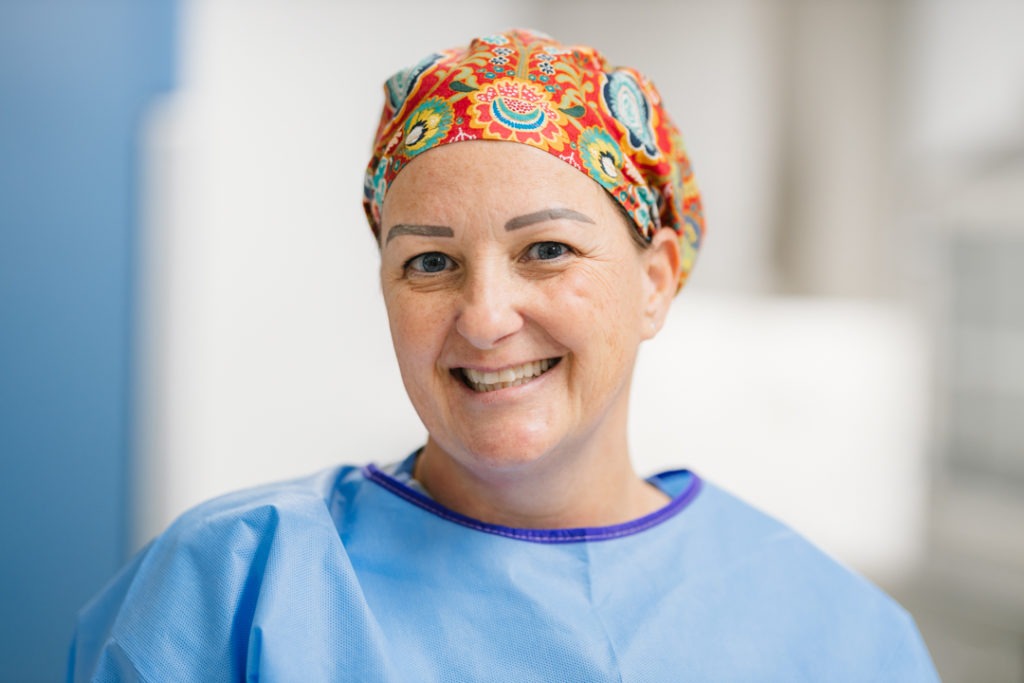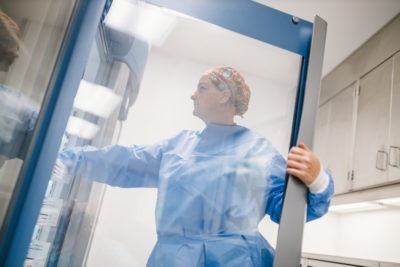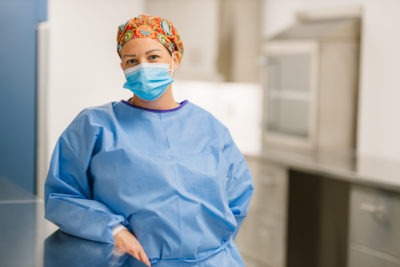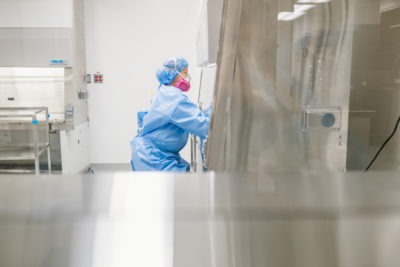
Introducing a pharmacy technician specializing in hazardous sterile compounding
There are a lot of people working behind the scenes to make sure cancer patients have the appropriate medication to help treat their illness. One such person is pharmacy technician April Shaw.
Shaw and her colleagues mix personalized, custom medication doses for each cancer patient. The drugs can be hazardous to anyone else, including the technicians, so they work in an incredibly clean, sterile lab space, with specialized equipment and safety gear.
She is one of more than a dozen pharmacy technicians who play a vital role in hazardous sterile compounding at the Juravinski Hospital and Cancer Centre (JHCC). Pharmacy technicians work in partnership with physicians, nurses and many others at the hospital, including the hematology pharmacy team, to provide safe, effective chemotherapy treatments for patients.
Shaw has worked with Hamilton Health Sciences for 18 years, and has provided hazardous sterile compounding for most of them. Like many of her colleagues who are moving into the new stem cell therapy unit at the JHCC, she is excited by the new capabilities and technology the pharmacy space will offer them as they work to provide patient care. The new unit will open the first week of November.
We spoke with April Shaw prior to Pharmacy Technician Day on October 20 to learn more about her role.


 What is it like to work in the hazardous sterile compounding area?
What is it like to work in the hazardous sterile compounding area?
Due to the hazardous nature of the products we use, we have to pay great attention to the environment in which these preparations are prepared, the training of personnel, and the quality assurance procedures to protect patients and staff. We adhere to strict national guidelines when we prepare medications for our patients. Pharmacy technicians are specially trained to compound these types of medications in a sterile, controlled environment which is monitored on an ongoing basis.
What types of products are compounded to help treat patients?
While we prepare all chemotherapy and hazardous medications for the whole hospital and other sites that do not have compounding facilities, the stem cell unit is where the majority of our compounds go. There are many different regiments for patients, with some including as many as three or four different compounds, depending of the patient’s needs. Study medications as well as medications supported by compassionate supply program are also compounded by the hazardous compounding team.
How did you become involved with this work?
I worked a few years at the JHCC and gained a lot of experience in mixing hazardous medications and checking the final product. When the role of the hazardous sterile compounding stager became available, I jumped at the chance for this exciting and challenging role. It is a great opportunity for me to continue with the compounding work while working directly with stem cell unit staff, pharmacists and pharmacy technicians on the unit.
What are your thoughts on the new pharmacy area?
The new pharmacy compounding and staging area is absolutely beautiful and ensures we meet all national standards relating to the compounding of sterile and non-sterile preparations. It’s a much bigger space with new, updated and modern equipment. Being involved in the behind-the-scenes planning work that goes into moving to a brand new facility has been very exciting.
What is the most rewarding part of your job?
Although compounding pharmacy technicians do not have patient contact, we never forget that there is a person depending on what we do on a daily basis. We are proud to be a part of making sure a patient gets the appropriate medication to treat their illness. To know we are a part of the health care team helping patients during a difficult time in their life is very rewarding.
